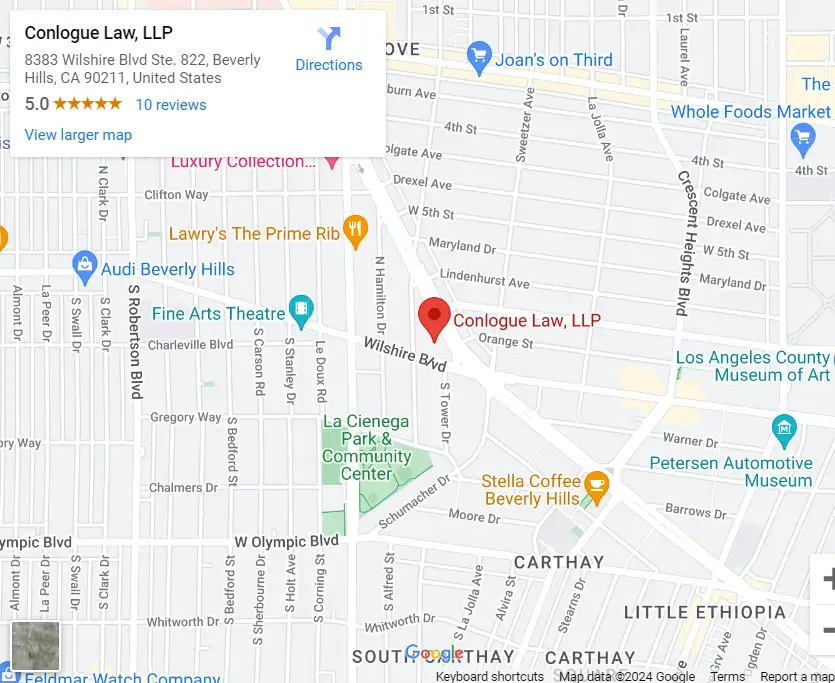What happens when the people meant to protect us break the rules instead?
Police misconduct is a big issue in Los Angeles County. Sometimes, officers use too much force, arrest people unfairly, or treat certain groups differently. These actions aren’t just wrong—they go against people’s rights. A California civil rights attorney helps those affected understand their rights and take action when the system seems unfair.
If someone experiences police misconduct, the first step is usually filing a police misconduct complaint to report what happened. Having proof, like videos or witness statements, can make the case stronger. But filing a complaint doesn’t always mean justice will be served, especially if police departments try to cover things up. That’s why knowing all legal options is important to make sure rights are protected in Los Angeles County.
Quick Summary:
- Some police officers misuse their power by using too much force, arresting people without cause, treating people unfairly, or searching homes without permission. These actions violate people’s rights. Some officers face punishment, but others go unpunished unless victims take legal action.
- Laws protect people from police abuse. The U.S. Constitution says officers must treat everyone fairly and cannot search property without a reason. Victims can sue, but “qualified immunity” can make it hard to hold officers accountable. California laws help by increasing transparency and protecting victims’ rights.
- Los Angeles has groups that investigate police misconduct and tools like body cameras to monitor officers. These help prevent abuse and track bad behavior.
- Victims can report police misconduct to the police department, oversight agencies, or a lawyer. Strong evidence, like videos or witness statements, can help prove wrongdoing and get justice.
Understanding Police Misconduct
Police misconduct occurs when law enforcement officers misuse their authority, violate legal procedures, or engage in actions that harm individuals or communities. These violations not only undermine public trust but also infringe on fundamental constitutional rights.
Common Types of Police Misconduct and Their Consequences
When police misconduct happens, it’s not just unfair—it can violate people’s rights and cause serious harm. Here are some common types of police misconduct in Los Angeles County and the possible consequences.
- When Police Use Too Much Force: Sometimes, officers use more violence than necessary. This can mean rough handling, tasering, hitting, or even shooting someone who isn’t a real threat. Officers caught using excessive force may be suspended, fired, or even face criminal charges. Victims can file lawsuits against both the officer and the police department, which can lead to financial settlements. If an officer’s actions result in serious harm or death, they could face charges like assault or manslaughter.
- Forgetting to Tell You Your Rights: When police arrest someone, they have to tell them their rights—like the right to remain silent and the right to a lawyer. If they don’t, statements made in custody might not be admissible in court. This mistake can weaken or even dismiss a case. Officers may be retrained or investigated for repeated violations.
- Getting Arrested for No Good Reason: Police need a good reason to arrest someone, like clear evidence of a crime. But sometimes, people get arrested because of mistakes, personal bias, or intimidation tactics. Officers might also keep someone locked up longer than the law allows. If an arrest isn’t justified, charges can be dropped, and the officer could face consequences. The person arrested unfairly might file a lawsuit for damages.
- Treating People Unfairly Because of Race: Some officers unfairly target people based on race or background, leading to more stops, harsher treatment, and wrongful arrests. If found guilty of racial profiling, police departments may be required to change policies, undergo training, or face lawsuits.
- Searching Without Permission or a Warrant: Police cannot search someone’s home, car, or belongings without a good reason or a proper warrant. If they ignore these rules, any evidence they find may be thrown out in court. Officers who conduct illegal searches could face suspension, termination, or even lawsuits. In serious cases, they might even be charged with a crime
- Pressuring People to Admit to Crimes: Sometimes, police pressure people into confessing to crimes they didn’t commit using threats, lies, or exhausting interrogations. These forced confessions can lead to wrongful convictions, but they may be overturned. Officers who do this could be sued, fired, or even charged with a crime. If someone is wrongly imprisoned, they might also receive compensation.
- Ignoring Medical Emergencies in Jail: Police must provide medical care to people in custody, but some ignore serious health issues or delay treatment. This can lead to severe harm or even death. Officers who fail to act could be suspended, fired, or sued. Families of victims may receive large financial settlements, and in serious cases, officers could even face criminal charges.
Some officers are held accountable, but others avoid punishment unless victims take legal action. Holding police responsible for their actions helps protect people’s rights and builds trust in the system.
Legal Protections Against Police Misconduct in Los Angeles County
There are laws that can help hold officers accountable. Both federal and state laws, as well as local rules in Los Angeles County, protect people from things like unfair treatment, illegal searches, and excessive force.
Federal Laws Protecting Your Rights
Police must follow the law, but legal protections exist when they abuse their power. The U.S. Constitution and federal laws protect against unlawful searches, discrimination, and misconduct. Knowing these rights helps people take action when violated.
- Protection from Unlawful Searches: The Fourth Amendment protects against unfair searches and seizures. Police usually need a warrant or proof of a crime to search a home, car, or belongings. This helps prevent illegal searches and wrongful arrests in Los Angeles County. Courts determine if a search was legal based on privacy rights and exceptions like emergencies.
- Protection from Discrimination: Everyone deserves to be treated fairly and equally under the law—that’s what the 14th Amendment is all about. This means police aren’t allowed to treat someone differently just because of their race, nationality, religion, or other personal traits. Unfair treatment violates a person’s rights and can be challenged. Those who experience discrimination by police have the right to speak up, take legal action, and push for changes to make sure everyone is treated fairly.
- The Right to Sue Police for Misconduct: Section 1983 allows people to sue police or government agencies for violating their rights. This applies to excessive force, false arrests, and other abuses of power. However, officers may claim qualified immunity, making lawsuits harder unless a clear law was broken. Strong evidence is needed to prove misconduct.
California Laws That Provide Stronger Protections
California has extra laws to make sure police are held responsible and treat people fairly. These laws add more protection than federal rules and help stop police from abusing their power.
- The Bane Act: Makes it illegal for police to threaten, hurt, or intimidate someone in a way that takes away their rights. This law is meant to protect people from police violence and wrongful arrests.
- Police Complaint Rules: Police departments must take complaints seriously and investigate when officers are accused of wrongdoing. This helps prevent cases from being ignored or covered up.
- The Racial and Identity Profiling Act: Requires police to keep track of who they stop and why. This helps make sure officers aren’t unfairly targeting people based on race or background.
- Senate Bill 1421: Allows the public to see police misconduct records, so people can find out if an officer has a history of excessive force or dishonest behavior.
- Assembly Bill 392 – Changes when police can use deadly force, allowing it only when absolutely necessary. This law encourages officers to use other ways to handle situations first instead of resorting to violence.
Accountability Measures in Los Angeles County
Los Angeles County has special rules and independent groups that watch over the police to make sure they’re doing their jobs fairly. These measures help prevent abuse of power and ensure officers treat people with respect.
- The Sheriff Civilian Oversight Commission is a group that keeps an eye on the police to make sure they follow the rules. They listen to complaints from the public, check if police policies are fair, and push for changes when officers do something wrong.
- The Office of Inspector General makes sure police investigations are handled properly. Their job is to watch over how officers investigate complaints and step in if they see unfairness, cover-ups, or cases being ignored.
- Special Order 40 is a rule that stops LAPD officers from targeting people just because of their immigration status. Instead of focusing on immigration, police are supposed to handle local crimes, so immigrants don’t have to fear deportation when reporting a crime or asking for help.
- Body-Worn Cameras are small cameras that police officers wear to record their interactions with people. Officers must turn them on during stops and arrests so there’s video evidence of what really happened. This helps keep officers accountable and can clear up any disagreements about their actions.
- The Early Warning System helps catch problem officers before things get worse. If an officer gets too many complaints, this system alerts their bosses so they can step in, correct the behavior, or take action before the officer causes serious harm.
Laws exist to protect your rights and hold police accountable when they violate them. Understanding these protections is important for making sure law enforcement respects the rights of everyone in the community.
How to Report Police Misconduct in Los Angeles County?
If a police officer treats you unfairly, uses too much force, or violates your rights, you have the right to file a complaint. Reporting police misconduct helps hold officers accountable and can lead to changes that make the system fairer for everyone. Here’s how you can do it.
Where to File a Complaint
If you think a police officer acted unfairly or used too much force, you have different ways to report it. The right place to file a complaint depends on which law enforcement agency was involved.
- Local Police Departments: If the officer was part of the Los Angeles Police Department (LAPD), you can file a complaint in several ways. You can do it online, call their complaint hotline, or visit any police station in person. No matter which method you choose, you’ll have a chance to explain what happened, and they should take your report seriously.
- Los Angeles County Sheriff’s Department (LASD): If a sheriff’s deputy was involved instead of an LAPD officer, you should report it to the LASD’s Internal Affairs Bureau. This department is in charge of investigating complaints against deputies. You can submit your complaint online, by phone, or in person at a sheriff’s station.
- Independent Oversight Groups: If you don’t trust the police to investigate themselves, you can report the misconduct to groups that oversee law enforcement. Two important organizations in Los Angeles County are:
- The Sheriff Civilian Oversight Commission, which looks into complaints, investigates officer misconduct, and checks department policies.
- The Office of Inspector General (OIG), which makes sure law enforcement agencies handle complaints fairly and thoroughly.
Some people file complaints with more than one agency to make sure their concerns are taken seriously. This can help prevent cases from being ignored or dismissed too quickly.
What You Need to Include in Your Complaint
When you report police misconduct, giving as much detail as possible can help investigators understand what happened and take action. Here’s what to include in your complaint:
- Your Contact Information: You can file a complaint without sharing your name, but if you provide your contact details, investigators can reach out if they need more information. This can help make your case stronger.
- Date, Time, and Location: Write down exactly when and where the incident happened. If you remember street names, landmarks, or nearby businesses, include those details. This helps investigators verify what happened and look for any security camera footage.
- Officer Details: If you know the officers’ names or badge numbers, include them. If not, describe what they looked like—such as their height, build, uniform, or any noticeable features. Also, mention if they were in a police car and note anything special about it, like the car number.
- What Happened: Explain step by step what led up to the incident, what the officers did or said, and how it affected you. Try to be as clear and honest as possible.
- Evidence: If you have photos, videos, medical records, or witness statements, include them. If other people saw what happened, try to get their names and contact information in case investigators need more details.
The more information you include, the easier it will be for investigators to look into your complaint. A well-documented report can help make sure the situation is taken seriously and could prevent similar incidents from happening in the future.
When to File a Complaint
There are deadlines for filing a police misconduct complaint. The time limit can vary depending on the type of misconduct and the agency handling the case. Generally, it’s best to file your complaint as soon as possible to ensure a proper investigation.
Seek Legal Representation if Needed
If you’ve experienced serious police misconduct—like being hurt by an officer, arrested for no reason, or treated unfairly because of who you are—you might need a lawyer to help you.
- Help with Your Complaint: Filing a complaint can be tricky, but a lawyer can walk you through it, help collect proof, and make sure your case is taken seriously.
- Represent You in Court: If you decide to sue, a lawyer can handle the legal work, stand up for you in court, and fight to get you compensation for what happened.
- Keep You Safe from Retaliation: Speaking out against police misconduct can sometimes lead to threats or unfair treatment. A lawyer can take steps to protect you and make sure your rights aren’t violated again.
If hiring a lawyer is too expensive, civil rights groups and legal aid organizations might be able to offer free or low-cost help.
Protect Your Rights and Hold Police Accountable – Call Our California Civil Rights Attorney Today!
Being treated unfairly by the police can leave you feeling helpless and unsure of what to do next. Many people in Los Angeles County experience excessive force, wrongful arrests, or other abuses of power and don’t know where to turn for help.
At Conlogue Law LLP, we understand how serious these situations are and are committed to fighting for justice. Our experienced civil rights attorneys work to hold law enforcement accountable and protect the rights of those who have been wronged. We also handle cases involving personal injury, wrongful death, and premises liability.
If you’ve been treated unfairly by the police, don’t stay silent. Contact us for a free consultation. Our experienced civil rights lawyers will listen to your story, review your case, and help you take the next steps toward justice.








